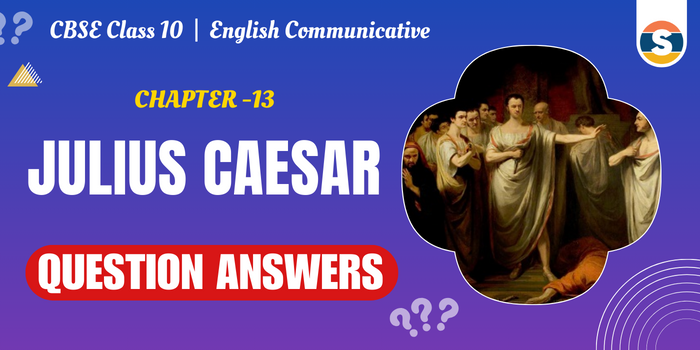CBSE Class 10 English Chapter 13 Julius Caesar Question Answers (Important) from Literature Reader (Communicative) Book
Looking for Julius Caesar question answers for Class 10 English Communicative- Interact in English Chapter 13 (Drama)? Look no further! Our comprehensive compilation of important questions will help you brush up on your subject knowledge. Practising Class 10 English Communicative question answers can significantly improve your performance in the exam. Our solutions provide a clear idea of how to write the answers effectively. Improve your chances of scoring high marks by exploring Drama: Julius Caesar now. The questions listed below are based on the latest CBSE exam pattern, wherein we have given solutions to the chapter’s extract based questions, multiple choice questions, short answer questions, and long answer questions.
Also, practising with different kinds of questions can help students learn new ways to solve problems that they may not have seen before. This can ultimately lead to a deeper understanding of the subject matter and better performance on exams.
Julius Caesar Question Answers – Book Questions, Extra Questions
- Julius Caesar Book Questions
- Julius Caesar Extract Based Questions
- Julius Caesar Short Answer Questions
- Julius Caesar Long Answer questions
Related:
- Julius Caesar Class 10 English Summary, Explanation, Difficult Words
- Character Sketch of Julius Caesar, Calpurnia, Mark Antony, Marcus Brutus, Decius Brutus and Cassius | Julius Caesar
- Julius Caesar MCQ
- Julius Caesar Previous Years Question with Answers
Julius Caesar Book Questions
1. Consult a dictionary and find out the difference between
a) a killing
b) an assassination
Ans-
a) a killing – to cause death of a person or a thing
b) an assassination – killing an important or famous person for money or for political reasons.
2. Many popular and powerful leaders have been assassinated in the past and in
recent times. Can you name some of them?
• ……………………………………………………
• ……………………………………………………
• ……………………………………………………
• ……………………………………………………
• ……………………………………………………
Ans- Mahatama Gandhi
Indira Gandhi
Siddhu Moosewala
Phoolan Devi
President Abraham Lincoln
Martin Luther King Jr.
3. Answer the following questions by selecting the correct options.
1. How does Caesar sound when he says, “Nor heaven nor earth have been at peace to-
Night”?
a) worried
b) angry
c) joyous
d) frightened
Ans- a) worried
2. Caesar’s reference to the senators as ‘graybeards’ shows his____________.
a) confidence
b) cowardice
c) arrogance
d) ambition
Ans- c) arrogance
3. Decius Brutus changes Caesar’s mind about going to the Senate by appealing to his______________.
a) ambition
b) vanity
c) greed
d) generosity
Ans- b) vanity
4. Select the option that correctly displays the offer that Cassius makes to Antony after Caesar’s assassination.
a) The conspirators would like to be friends with him
b) He may take Caesar’s body to the pulpit and speak to the crowd praising Caesar for his achievements
c) His recommendations will be as strong as that of the conspirators while distributing the powers and benefits to friends
d) He may join the conspiracy against Caesar
Ans- a) The conspirators would like to be friends with him
5. Why does Cassius try to stop Brutus from letting Antony speak at Caesar’s funeral?
He knows that_______________.
a) the Roman mob loves Caesar and Antony
b) Brutus is not a good orator
c) they should not have killed Caesar
d) Antony is a good orator who can sway the mob
Ans- d) Antony is a good orator who can sway the mob
6. What prophecy does Antony make over Caesar’s dead body?
a) Romans will see Caesar’s ghost roaming on the streets
b) Rome will experience fierce civil war in which many people will die
c) Rome will be ruled by Ate
d) Roman women will smile at the death of Caesar
Ans- b) Rome will experience fierce civil war in which many people will die
7. After listening to Brutus’ speech, the Third Citizen says ‘Let him be Caesar’. This clearly shows he________________.
a) has not understood Brutus’ reason for killing Caesar
b) loved Caesar more than he loves Brutus
c) loves Brutus more than he loved Caesar
d) thinks Brutus killed Caesar to assume power.
Ans- a) has not understood Brutus’ reason for killing Caesar
8. Identify Antony’s tone when he calls the conspirators, ‘honourable men’.
a) admiring
b) flattering
c) angry
d) mocking
Ans- d) mocking
9. Antony’s reference to Caesar’s conquest of the Nervii is to _______________.
a) remind the mob of Caesar’s greatness as a warrior
b) make the mob feel afraid of being attacked by the war-like race
c) make the crowd weep for Caesar who died at war
d) stop and collect his emotions as he is feeling very upset
Ans- a) remind the mob of Caesar’s greatness as a warrior
10. Antony remarked :
Mischief, thou art afoot,
Take thou what course thou wilt!.
What does this show him to be?
a) a ruthless manipulator
b) an honourable man
c) a loyal friend
d) a tactful man
Ans- c) a loyal friend
4. Answer the following questions briefly.
a) How do the heavens ‘blaze forth’ the death of Julius Caesar?
Ans- The watchman observes terrible and terrifying things. In the streets, he witnessed a lioness giving birth, powerful warriors engaging in deadly combat and blood pouring onto the Capitol, ghosts screeching and squealing, and the dead emerging from the grave. In addition to this, Calpurnia experienced terrifying nightmares. All of these events were out of the ordinary and implied bad luck. As a result, heavens “blaze forth” Julius Caesar’s demise.
b) What does Calpurnia try to convince Caesar of?
Ans- Calpurnia tries to convince Caesar that he should not go out of the house that day as some mishap may occur. She tells Caesar about her terrifying nightmares and believes they are a bad omen. She advises him not to leave the house for the sake of his safety.
c) Why does Calpurnia say Caesar’s ‘wisdom is consumed in confidence’? What does she mean?
Ans- Calpurnia says that Caesar’s ‘wisdom is consumed in confidence’ because Caesar decides to go to the Senate ignoring all the signs which foretell him about threat. In Calpurnia’s opinion, Caesar had become overconfident and was unable to recognise that his life was in danger. Julius doesn’t behave wisely and rejects the thought of waiting since doing so would make him look like a coward.
d) What does Calpurnia dream about Caesar? How does Decius Brutus interpret the dream?
Ans- Calpurnia had a dream that blood was coming from a hundred different locations and that many Romans had come to wash their hands in it. According to Decius Brutus, it was a fortunate dream. He predicts a new era for both Rome and the Roman people. Great men will assemble around Caesar, smearing his blood on their handkerchiefs. Distinguished men will get honour at his hands and everything relating to him will be held in utmost admiration.
e) What are the arguments put forward by Decius Brutus to convince Caesar to go to the Capitol?
Ans- Decius Brutus is a cunning man. Decius Brutus argued that because the Senate had already resolved to give Caesar a crown, they might change their minds if he didn’t go. In light of this, Caesar decides to visit the Capitol.
f) Why is Decius more successful than Calpurnia in persuading Caesar?
Ans- Decius Brutus can flatter people quite well. Due to the fact that his argument plays on Caesar’s pride, he is more successful in convincing Caesar than Calpurnia. Calpurnia wants Caesar to stay at home after she had nightmares, while Decius Brutus regards the dreams as lucky and fortunate. He believes they represent Caesar’s might and authority. He bolsters Caesar’s ego. Caesar chooses to visit the Capitol after becoming completely fascinated by his speech.
g) What is the petition put before Caesar by the conspirators? How does Caesar respond to it?
Ans- The conspirators want that Caesar should call Publius Cimber home as he had banished him. They ask him to reconsider his prior decision. Caesar, though, is in no mood to compromise. He claims to be firm like a Pole Star. His heart will not be softened by bowing and stooping activities and if Mettellus Cimber continues such activities, he would turn him away like a street dog.
h) Who says “Et tu Brute”? When are these words spoken? Why?
Ans- When Brutus and other conspirators stab Caesar, Caesar utters these words. In the Senate House, Caesar was stabbed, and Brutus follows suit. Caesar had not anticipated Brutus to act in such a sly manner. With his crushed heart, Caesar cries out “Et tu Brute” as he attempts to protect himself.
i) In the moments following Caesar’s death what do the conspirators proclaim to justify Caesar’s death?
Ans- Following Caesar’s passing, the conspirators assert that tyranny in Rome has come to an end. They yell out slogans like “Peace, Liberty, Freedom, and Enfranchisement.” Caesar was an outstanding leader, but some claim he had grown overly ambitious.
j) Seeing the body of Caesar, Antony is overcome by grief. What does he say about Caesar?
Ans- When Antony sees the strong Caesar on the ground, he is overcome with anguish and despair. “O mighty Caesar!” he exclaims. Are all of your victories, triumphs, and riches reduced to this little scale by how low you are lying down? Goodbye. He claimed to know nothing about the conspirator’s plans. He’s prepared to perish at their hands. His life is not as valued as Caesar’s, thus he will consider it a blessing if he dies with the same weapon that murdered Caesar. He bade Caesar a tearful goodbye. He believed that Caesar brought glories, victories and gains in war to the city of Rome.
k) Whom does Antony call ‘the choice and master spirits of this age”? Why?
Ans- Antony calls the conspirators “the choice and master spirits of this age”. He says this because they had just killed the leader of the Roman Empire.
l) How do Brutus and Cassius respond to Antony’s speech?
Ans- After listening to Antony’s speech, Brutus assures him that even though the act seems bloody, their intentions were noble. Their pity for the common people of Rome overrode their pity for Caesar. Cassius offers Antony a new job in the government administration.
m) Why does Cassius object to allowing Antony to speak at Caesar’s funeral? How does Brutus overcome this objection?
Ans- Cassius does not believe Antony should speak at Caesar’s funeral because he would influence the attendees’ opinions. But Brutus insists that Antony would only speak if they allowed him to, that he will speak first, and that his speech will list the reasons why Caesar had to be killed.
n) What are the conditions imposed by the conspirators before allowing Antony to speak at Caesar’s funeral?
Ans- Mark Antony was given the directive to only praise Caesar and not point the finger at the conspirators in his eulogy. He was required to address the crowd from the same platform as Brutus and explain that he was given permission to do so by the conspirators.
o) When he is left alone with the body of Caesar, what does Antony call Brutus and the others?
Ans- Antony begs Caesar to pardon him if he has been meek and compassionate with his assassins. Antony calls Caesar the most legendary man the world has ever known. He curses the men who have killed Caesar.
p) What prediction does Antony make regarding the future events in Rome?
Ans- Antony says that the Romans will pay for the sin they have committed by murdering Caesar. Then they shall be cursed. Numerous awful things will befall to the Romans. The nation will experience a violent civil war that will result in death and damage. Many cruel acts will be carried out. Mothers will see the dismemberment of their loved ones. Caesar’s ghost will wander in search of vengeance for his death.
q) What reasons does Brutus give for murdering Caesar?
Ans- According to Brutus, he murdered Caesar because the latter had grown arrogant and desired to rule Rome. He assassinated Caesar in order to strengthen Rome. He was also prepared to give his life in defence of his nation. Caesar was respected as long as he was valiant, but when he turned ambitious, he was slain.
r) Who says, “Let him be Caesar”? What light does this throw on the speaker?
Ans- The third citizen says “Let him be Caesar” after Brutus has finished his speech justifying Caesar’s killing. Brutus in his speech proclaims that the public can kill him if he too becomes ambitious like Caesar. He has the same dagger for himself and he is willing to lay down his life for his country. The citizens are fully satisfied. They praise Brutus and show their sympathy for the act.
s) Why is Antony’s speech more effective?
Ans- Antony’s speech is more effective because it is genuine and full of emotions and feelings for Caesar. He very skillfully informs the audience that Caesar was not ambitious but rather had turned down the crown three times. He enhanced the glory of Rome with his victories. He specified in his testament that each Roman would get 75 drachmas. He gave his property and gardens to the general public for use. He tries to gain the sympathy of the people through displaying Caesar’s injured body. After Antony’s speech, the mob gets furious and rushes to murder the conspirators.
t) What is the fate of Brutus and Cassius, at the end of the scene?
Ans- After Antony’s speech, the crowd is outraged. They move quickly to murder the assassins. Their homes are set on fire. Inside a tent, Cassius and Brutus prepare to confront the adversary and discuss their plan of attack. However, they quickly become friends after their intense arguments. Cassius kills himself because he can’t tolerate losing. Brutus is troubled by Caesar’s apparition. Brutus knows his end is near. He requests that Starto hold his sword before running over it and killing himself.
5. Julius Caesar and Antony reveal something about their character in their words and actions. We also learn about them from what other people say. Can you pick out the words that describe them from the box given below? Also, pick out lines from the play to illustrate your choice.

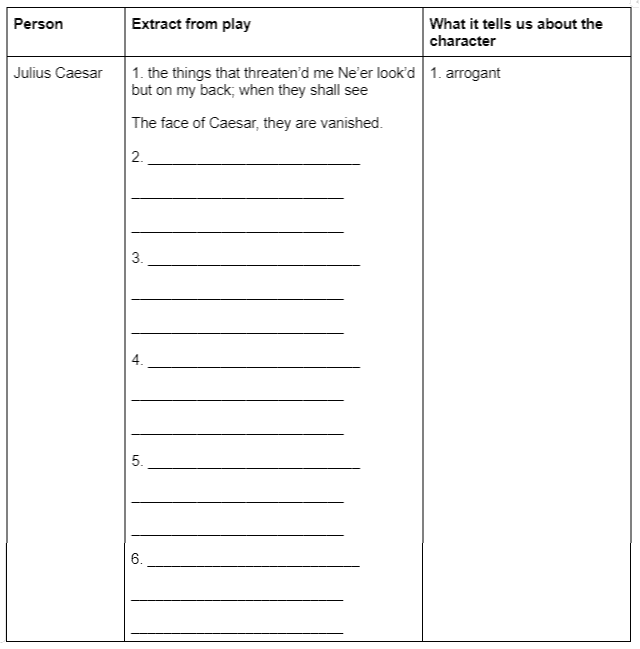
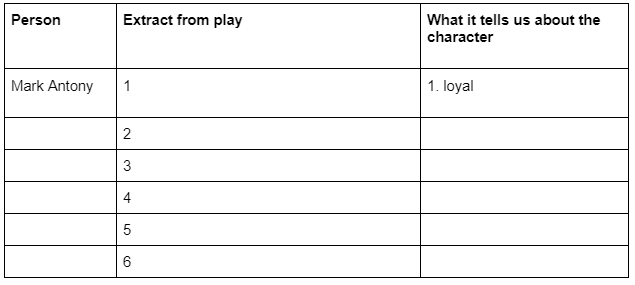
Ans-
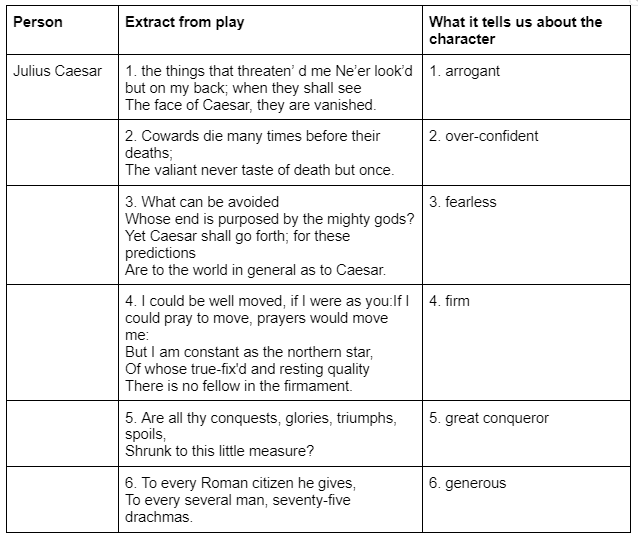
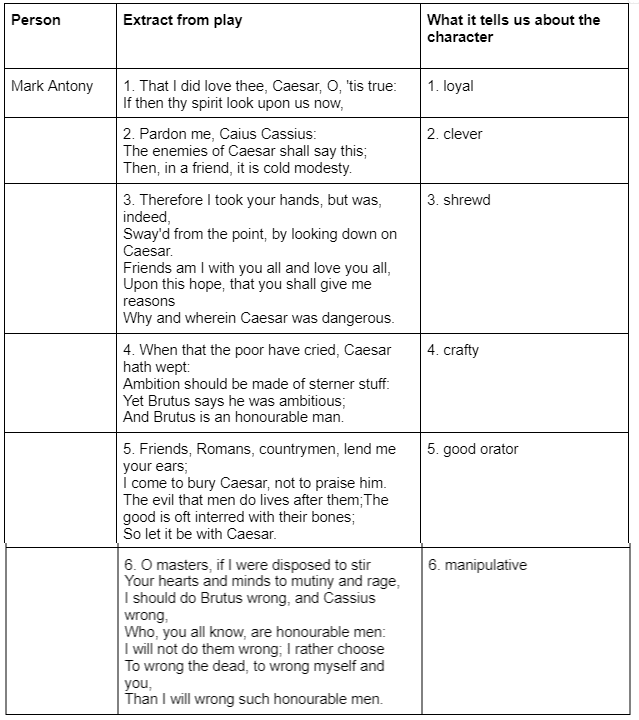
6. In the play ‘Julius Caesar’, we meet the Roman mob. We find that as Brutus and Antony speak, the mob displays certain qualities and characteristics.
Given below are some characteristics of the mob. Complete the table by quoting the lines wherein these are revealed.
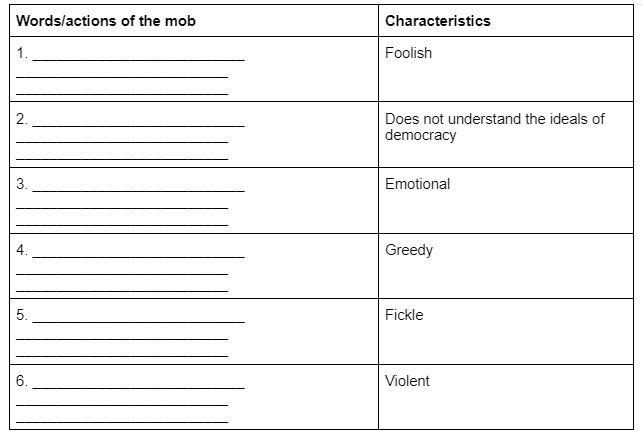
Ans-
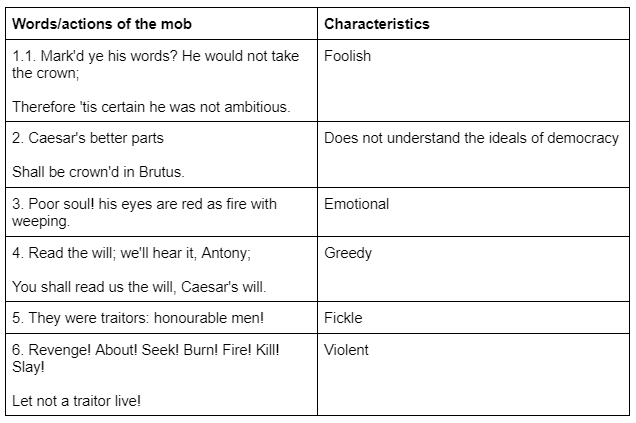
7. Antony employs a number of devices to produce the desired effect on the mob.
These devices maybe described as rhetorical devices. He first speaks in such a manner that it seems to the mob that he is in full agreement with Brutus about Caesar. Then step by step he moves away from Brutus’ position, depicting Brutus as a villain and Caesar as a wronged man. Copy and complete the following table by showing how Antony builds the argument in Caesar’s favour
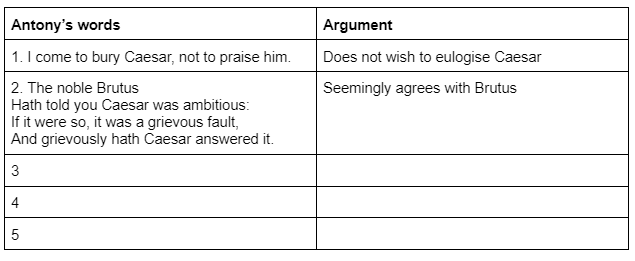
Ans-
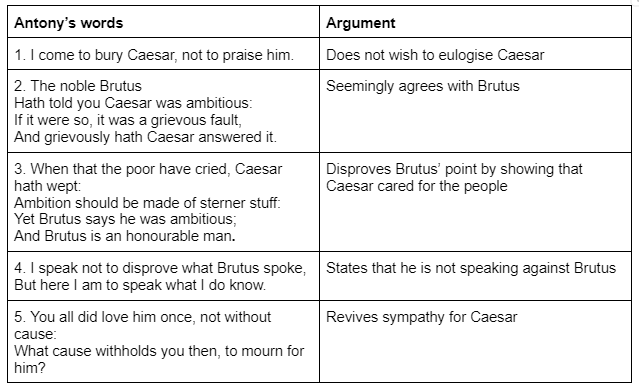
8. Read the extracts given below and answer the questions that follow:
1. CAESAR Cowards die many times before their deaths;
The valiant never taste of death but once.
Of all the wonders that I yet have heard.
It seems to me most strange that men should fear;
Seeing that death, a necessary end,
Will come when it will come.
a) Choose the option that is relevant to [A] Assertion and [R] Reason.
[A] A brave person dies only once.
[R] A brave person faces any difficult situation or challenges.
A. Both [A] and [R] are true and [R] is the correct explanation of [A].
B. Both [A] and [R] are true and [R] is not the correct explanation of [A].
C. [A] is true but [R] is faise.
D. [A] is false but [R] is true.
Ans- A. Both [A] and [R] are true and [R] is the correct explanation of [A].
b) The strangest thing that Caesar ponders is why___________.
A. cowardly people die again and again
B. brave people die only once
C. men are afraid of death
D. death is inevitable
Ans- C. men are afraid of death
c) What fears has the listener expressed?
Ans- Calpurnia has expressed a fear that the ominous signs during the night might mean that Caesar’s life is in danger.
d) What is the basis for the fears expressed?
Ans- The basis of her fears are the unearthly events during the previous night and the strange dream which she had.
e) Why has death been called a ‘necessary’end?
Ans- “Death, a necessary end, will come when it will come.” (Julius Caesar)
Human beings are motral and thus for them, death is inescapable. As Caesar explains in Julius Caesar, there is no use worrying about it. We can only live our lives to the fullest until then.
2. But here’s a parchment with the seal of Caesar;
I found it in his closet, ’tis his will:
Let but the commons hear this testament–
Which, pardon me, I do not mean to read–
And they would go and kiss dead Caesar’s wounds
a) select the option that appropriately fills the blank.
parchment:_____________: will: testament
A. dry land
B. front area
C. pulp
D. paper
Ans- D. paper
b) Antony says he doesn’t mean to read the will because
A. he feels it is confidential.
B. he finds the contents inappropriate.
C. the Romans will grieve for Caesar’s death.
D. the Romans will kiss Caesar.
Ans- C. the Romans will grieve for Caesar’s death.
c) What are the contents of Caesar’s will that he is referring to?
Ans- Caesar has given seventy-five drachmas to every Roman. He has left all his walks, orchards on the side of the Tiber to the common men.
d) Why does the speaker read Caesar’s will to the citizens?
Ans- The speaker reads Caesar’s will to the audience to play on their sympathy, and to make Caesar look like a great, benevolent ruler.
e) Identify the option that this the technique used by Antony in the given extract.
A. reverse psychology
B. rhetoric
C. dramatic contrast
D. persuasion
Ans- A. reverse psychology
f) Choose the option that lists the emotion of the citizens after listening to the ‘will’.
1. aggressive
2. nervous
3. enraged
4. berserk
5. Powerful
Ans- 1. Aggressive 3. Enraged 4. berserk
9. Questions for Further Study :
Given below are some questions based on reading of the play ‘Julius Caesar’. These
questions are not for testing in the Exam. These are for a deeper understanding of the
play and the characters.
a) Why was the conspiracy to assassinate Julius Caesar hatched?
Ans- The conspiracy to assassinate Caesar was hatched to prevent him from being crowned the king of Rome. Brutus and Cassius had animosity against Caesar and they wished to have the control of Roman empire in their hands rather than with Caesar.
b) Was Caesar really ambitious? Find evidence from the play to support your answer.
Ans- Caesar was not ambitious. He provided Rome and the Romans several wins and triumphs. He was a compassionate leader and. He refused the crown thrice. Caesar had a lot of empathy. He was aware of how the underprivileged felt. He promised each Roman 75 drachmas.
c) What was Cassius’ motive for murdering Julius Caesar?
Ans- Cassius was envious of Caesar’s rise to prominence and power. In actuality, he didn’t want people to think of Caesar as the great global conqueror. He wanted to assassinate Caesar because he did not want him to have power over the Romans.
d) Why was it essential for the conspirators to include Brutus in the conspiracy?
Ans- Brutus was a fervent patriot. Caesar, in his opinion, was a tyrant. Although he was close to Caesar, he teamed up with the conspirators to free Rome from the dictator’s rule. He believed that killing Caesar was important for the welfare, liberty, and freedom of Rome. It was necessary for the conspirators to include Brutus as he was friends with Caesar and Caesar could count on him and trust him completely.
e) What were the mistakes made by Brutus that led to the failure of the conspiracy?
Ans- Jealous of Caesar’s increasing authority, Casca, Cinna, and Cassius plan to kill him. Brutus, on the other hand, wishes to see an end to Caesar’s rule over the Roman people. He makes the decision to murder Caesar along with other conspirators. Caesar is taken to Capitol by Cassius and Brutus, who then stab him. The scheme to murder Caesar is revealed to Antony. Antony asks Brutus for approval so that he might speak at Caesar’s burial. Brutus agrees and after his speech, Antony speaks. Antony incites the people to attack the conspirators. Brutus and Cassius are made to commit suicide. The mistake of letting Antony address the mob led to the failure of conspiracy.
f) Comment on Caesar’s friendship with Antony.
Ans- Antony was a dear friend of Caesar. He disagreed with Brutus that Caesar was a self-centered individual who desired to rule over Rome. He claimed that Caesar was actually willing to sacrifice his life for Rome. Following Brutus’ remarks at Caesar’s burial, Antony makes a moving address. He claims that Caesar was not at all ambitious. Caesar refused the crown three times. He said that Caesar had left each Roman 75 drachmas. Antony played on the emotions of the crowd and even displayed Caesar’s disfigured corpse. After hearing Antony’s speech, the mob turned against the conspirators. By doing this, Antony honoured and respected Caesar.
g) Write a brief character sketch of Antony.
Ans- Antony is a dear friend of Caesar. He is totally committed to Caesar. He desires that Caesar be proclaimed king. He is also a great orator and craftsman. He mostly engages in celebration and musical entertainment. He sees life as a celebration.
A clever man, Antony, is successful in fooling Brutus into believing that he is with the conspirators after the death of Caesar. He gives a powerful speech that convinces the mob that there was a plot to kill Caesar. He truly cares about Caesar and wants to get revenge against the conspirators. His speech is to blame for the conspirators’ defeat.
h) What is the role of Julius Caesar’s ghost in the play, Julius Caesar?
Ans- In the play, Julius Caesar’s ghost makes appearance twice: the first is when Brutus is asleep in his tent and it stands by his bedside silently. The second occurrence is during the war in Philippi,the ghost appeared in front of Antonius and Octavius. It did not speak anything. The ghost’s goal was to convince Brutus of his error. His emotions overcame him, and he joined the conspirators. Rome saw upheaval and instability after Caesar’s death. Brutus, who is upset by everything, kills himself with his own sword.
i) Why does Antony call Brutus ‘the noblest Roman of them all’?
Ans- The phrase “the noblest Roman of them all” used by Antony to describe Brutus is sarcastic. He actually wants to inform the populace that, contrary to Brutus’ assertion, Caesar was not at all ambitious, but he holds off on saying this outright in favour of citing examples and provoking the audience gently and methodically. Antony is a convincing speaker. In order to attract the public’s attention and compassion, he initially refers to Brutus as the noblest Roman. Slowly he reveals to the populace that Brutus’ personal vendetta against Caesar, not Caesar’s ambition, was what ultimately led to Caesar’s death. By turning the mob against the conspirators, Antony is able to get revenge for the death of his dear friend.
j) How do Brutus and Cassius meet their end?
Ans- Brutus wants that their forces should move to Philippi and attack the enemy. Cassius rejects the idea and walks away. Brutus and Cassius lead their forces to the armies of Octavius and Antony on the fields of Philippi. Octavius’ intervention puts a halt to their wrongdoing. The troops of Cassius and Antony then engage in combat, with Antony winning. Cassius kills himself because he was unable to accept his defeat. Brutus too is disheartened and kills himself with his own sword.
10. A reporter covers the event of the assassination of Julius Caesar in the senate.
Giving graphic details and a catchy headline, write the newspaper report in about 200 words.
Ans-
End of a legend
Today was a dark day in the history of Rome. Julius Caesar, an accomplished son of the land, was murdered in broad daylight. Caesar came to the Capitol to be crowned the king.
The details of his death are really disturbing. Metellus Cimber petitioned Caesar to overturn his brother’s exile in the early hours of the morning as he was just taking his seat in the Senate. Caesar declined to grant his request. Then, a large group of senators who were all involved in the criminal scheme gathered around him and urged him to revoke the order. When Caesar again declined, they all stabbed him with daggers that were concealed under their clothing, one by one.
Brutus was a close friend of Caesar’s. When Brutus, one of the assailants, stabbed Caesar, Caesar collapsed and cried out, “Et tu Brute”, meaning “You too Brutus”
Extract Based Questions
Extract-based questions are of the multiple-choice variety, and students must select the correct option for each question by carefully reading the passage.
A. Read the extract and answer the questions that follow-
CAESAR: “Cowards die many times before their deaths;
The valiant never taste of death but once.
Of all the wonders that I yet have heard.
It seems to me most strange that men should fear;
Seeing that death, a necessary end,
Will come when it will come.
Re-enter Servant
What say the augurers?”
Q1. Who is Caesar speaking to? Why does he say these words?
Ans- Caesar is speaking to his wife Calpurnia. He says these words because Calpurnia wants him to stay at home as she feels his life is in danger.
Q2. How do cowards die and why?
Ans- Cowards die many times before their deaths because they are always scared as to when death might come to them.
Q3. When does the valiant taste death?
Ans- The valiant never tastes death but only once in life.
Q4. Choose the most suitable meaning of the word “augurers”.
- One who foretells the future from the behavior of birds.
- One who foretells the future from the behavior of planets.
- One who foretells the future from the behavior of dogs.
Ans- I. One who foretells the future from the behavior of birds.
B. Read the extract and answer the questions that follow-
“A lioness hath whelped in the streets;
And graves have yawn’d, and yielded up their dead;
Fierce fiery warriors fought upon the clouds,
In ranks and squadrons and right form of war ,
Which drizzled blood upon the Capitol;
The noise of battle hurtled in the air,
Horses did neigh, and dying men did groan,
And ghosts did shriek and squeal about the streets.
O Caesar! these things are beyond all use ,
And I do fear them.”
Q1. Name the speaker. Why does she say these lines?
Ans- Calpurnia speaks these lines to her husband Julius Caesar. She is describing to him the nightmare that she saw the previous night.
Q2. What happened to the graves?
Ans- The graves opened up and the dead roamed around the streets of Rome.
Q3. What happens on the clouds?
Ans- Fierce warriors fought in the clouds in ranks and squadrons—the usual military formations—until blood drizzled down from the sky onto the Capitol.
Q4. Find a word that means the same as “give birth to”
Ans- whelped
C. Read the extract and answer the questions that follow-
“ CAESAR And you are come in very happy time ,
To bear my greeting to the senators
And tell them that I will not come to-day:
Cannot, is false, and that I dare not, falser:
I will not come to-day: tell them so, Decius.
CALPURNIA Say he is sick.
CAESAR Shall Caesar send a lie?
Have I in conquest stretch’d mine arm so far,
To be afraid to tell graybeards the truth?
Decius, go tell them Caesar will not come.
Q1. Where are the speakers? Who has come to meet Caesar?
Ans- The speakers are at Caesar’s house. Decius Brutus has come to meet Caesar.
Q2. What message does Caesar wish to send? To whom?
Ans- Caesar wishes to send a message to the senators, saying that he will not come to the senate that day.
Q3. Who are the ‘greybeards’? Why is Caesar not afraid of them?
Ans- Caesar mockingly calls the senators old men or ‘greybeards’. He is not afraid of them because he is a mighty conqueror.
Q4. What is the lie mentioned in the above lines`?
Ans- Calpurnia, Caesar’s wife tells Decius to tell a lie to the senators that Caesar will not come as he is lying sick. In reality, Caesar is not sick.
D. Read the extract and answer the questions that follow-
‘But I am constant as the northern star,
Of whose true-fix’d and resting quality
There is no fellow in the firmament. I was constant Cimber should be banish’d, And constant do remain to keep him so.’
Q1. Who is “I” in the first line?
Ans- Julius Caesar
Q2. Why does Caesar compare himself to the ‘northern star’? What is the occasion?
Ans- Caesar compares himself to the ‘northern star’ because he does not change his mind and remains unshakeable.
Q3. State the comparison made by Caesar between the firmament and the world of men.
Ans- Caesar draws a comparison between the firmament and the world of men, noting that while the sky was studded with countless stars that were all brilliantly glowing, there was only one that did not move—the pole star. Similar to this, there were other powerful and brilliant beings in the world of mankind, but only Caesar remained steadfast in his beliefs.
Q4. Find a word which means the same as “heavens or sky”
Ans- Firmament
E. Read the extract and answer the questions that follow-
“O mighty Caesar! dost thou lie so low?
Are all thy conquests, glories, triumphs, spoils ,
Shrunk to this little measure ? Fare thee well.
I know not, gentlemen, what you intend,
Who else must be let blood, who else is rank:
If I myself, there is no hour so fit
As Caesar’s death hour, nor no instrument
Of half that worth as those your swords, made rich
With the most noble blood of all this world.
I do beseech ye, if you bear me hard ,
Now, whilst your purpled hands do reek and smoke,
Fulfil your pleasure. Live a thousand years,
I shall not find myself so apt to die:
No place will please me so, no mean of death,
As here by Caesar, and by you cut off,
The choice and master spirits of this age.
Q1. Who is the speaker of above lines?
Ans- Antony
Q2. Where does the mighty Caesar lie? What is meant by ‘this little measure’?
Ans- The mighty Caesar lay on the ground at the foot of Pompey’s statue. ‘This little measure’ means this small piece of land.
Q3. Who are the gentlemen Antony addresses?
Ans- The gentlemen that Antony addresses are the conspirators standing next to Caesar’s body.
Q4. Write the meaning of the following words.
Dost
Thou
Thy
Thee
Ans- Dost- do
Thou – you
Thy – your
Thee – you
Short Answer Questions
In this post we are also providing important short answer questions from Chapter 13 Julius Caesar (Drama ) for CBSE Class 10 exam in the coming session
Q 1. What is your impression about Julius Caesar’s character?
Ans.: In all of Rome, Julius Caesar stands out as a courageous competent leader. He participated in several battles. His kingdom grew by his victories. His overconfidence and haughtiness end up becoming his flaws. Because of his passion for flattery, Decius was able to get him to the senate on that fateful day.
Q 2. What had the senators decided to do that day?
Ans. Decius Brutus said that the senators had chosen to make Caesar the new ruler of Rome. They could reconsider if Caesar stayed back home. Decius informs Caesar and he agrees to go.
Q 3. What was Metellus Cimber’s plea?
Ans. Cimber wished to get his brother’s expulsion from Rome reversed. He wished for his brother to be pardoned and permitted to return to Rome as a legitimate citizen.
Q 4. Why is Antony ‘meek and gentle’ with the ‘butchers’?
Answer: Antony knew he was alone, and the conspirators were in large numbers. However, he was clever and was buying time. He presents himself as “meek” and “gentle,” but on the inside, he is outrageous and seeks revenge in any circumstance.
Q5. Why does Cassius caution Brutus against allowing Antony to speak in the funeral of Caesar?
Ans. Cassius was fully aware of Antony’s oratory prowess. Additionally, he was aware of Antony’s intelligence and his capacity to use this knowledge against them. He worries that he would inspire the populace to oppose them. His worries prove to be accurate.
Q6. How did Brutus convince Cassius?
Ans. Cassius received Brutus’ assurance that nothing would transpire since Antony would inform the populace that he was present with their consent. First, Brutus would speak from the pulpit and make sure Antony didn’t say anything negative about them.
Q7. How did Antony prove Brutus wrong?
Ans. Antony, true to his words, does not blame Brutus or the conspirators right away. But he employs all available rhetorical strategies, reveals the truth to the populace over time, and does a very smart job of exposing the murderers.
Q8. How does Antony show them the cuts and the most unkind cut of all?
Ans.Antony shows them the mantle with cuts made at different places by the conspirators, then the cut through which Brutus had stabbed Caesar. This was the most unkind cut as Brutus was his loved one and his betrayal was the cause of Caesar’s death.
Q9. Why did Brutus kill Caesar?
Ans. Although Brutus adored Caesar, he loved Rome more. The Romans would have been made into slaves if Caesar had survived. Caesar had to be put to death because of his overambition. Caesar had to be killed if the Romans were to succeed.
Q10. What was Antony’s purpose behind the funeral speech?
Ans. The intention was to incite the irrational masses to seek vengeance by fighting the conspirators. He is successful as the populace prepares to rebel and rises up to set the traitors’ homes on fire.
Q11. Do you think the people were fickle-minded? Why do you think so?
Ans. When Brutus speaks, people immediately and without hesitation agree with all he says. When Antony enters, they change their minds.
Q.12. How was Caesar’s murder avenged?
Answer: The enraged mob rushes to find the conspirators as they get irrational. There is civil strife. Later, Antony and Octavius beat Brutus and Cassius in a battle. Having no other option, they kill themselves. Caesar’s assassination was thus avenged.
Q13. How does Decius Brutus interpret Calpumia’s dream?
Ans. According to Decius Brutus, the dream has been misinterpreted. He very carefully and skilfully gives the dream a new meaning by labelling it fortunate. He argues that the Romans would receive fresh life and vigour from Caesar’s blood. They would preserve the aristocratic blood for posterity by dipping their handkerchiefs in it. The blood would be used to adorn their military badges, mementos, and coat of arms.
Q14. What argument did Brutus put forward in defence of Caesar’s murder?
Ans.: Brutus was good friends with Caesar and a man of high ideals. Unfortunately, he agreed with the conspirators who said that Caesar was overly ambitious and a danger to the democracy and freedom of the Roman people. In order to justify the killing, he makes the claim to the Romans that he loved Rome more than he did Caesar.
Q15. Why is Cassius not in favour of Antony addressing the Roman mob?
Ans. One of the conspirators, Cassius, opposed Antony speaking before the Romans. He was worried that Antony, a devoted friend of Caesar and a skilled orator, would incite the people to rebel against the conspirators and seek revenge for Caesar’s murder.
Q16. What arguments does Antony put forward to refute the charge that Caesar was an ambitious man?
Ans. The conspirators’ claim that Caesar was ambitious is strongly refuted by Mark Antony.He pointed out to the Romans how after each victory, Caesar stuffed the coffers. Three times the crown had been given to him, but each time he had declined. He also impressed upon the crowd the generosity of their leader who had passed on his belongings to the people of Rome.
Question 17. Why does Brutus kill himself?
Ans. In ancient Rome, it was considered more honorable for a Roman leader to commit suicide rather than face the humiliation of capture. If Brutus were taken prisoner, he would have likely been chained and paraded down the streets of Rome as a trophy, and he would ultimately have been executed for his crimes, so Brutus likely chose suicide to avoid such suffering and shame. Also, since Julius Caesar is based on historical events, Shakespeare simply presents this historical fact in his play.
Long Answer Questions
Q 1. What does Antony say in his speech? Why is it more effective than that of Brutus?
Ans. Antony addresses the Roman crowd directly after reaching an agreement with the conspirators and receiving their approval. He makes the excuse that he is not there to talk poorly of Brutus and the others while praising Caesar. He does the exact opposite, though. He begins by recounting the victories, triumphs, and awards that Caesar brought to Rome. He brought many captives, received ransoms and tributes. He grieved for the underprivileged and their cause.
He dedicated his own garden and parks to the Romans in his will. He had the Roman populace as heirs. Caesar declined the throne that was three times offered to him. He clearly demonstrated that Brutus and the other conspirators were murderers and liars. He was successful in inciting the mob to feel compassion for Caesar and to turn their wrath on the conspirators.
Q 2. Caesar’s end was tragic. He did a lot for the people of Rome but still he was murdered by his friends. How did they justify his murder?
Ans. A number of powerful and influential people were jealous of Caesar’s growing power and popularity. They all decided to finish him off. They had their personal grudges and jealousies. Being the scheming kind, they were not respected by the people. They hatch a plot to kill Caesar.
To give credence to their act and to justify themselves, they poisoned the mind of Brutus, the noble and most trusted and respected man in Rome. They made him believe, Caesar was ambitious and in the interest of Rome, he should be finished. Brutus, who loved Rome more than anything else, agreed and joined the conspirators. Caesar was murdered by his own friends.
Q3. Loyalty is inherent in friendship. A friend is expected to avenge the hurt caused to his friend. Describe how Antony proves his loyalty to Julius Caesar by bringing the conspirators to justice.
Ans. Caesar was a victim of a conspiracy. Mark Antony, a very close friend and confidant of Caesar, a true patriot in his own right, was shocked and mourned when he got to know about the horrific crime. He demonstrates to the Romans that the accusations made against Caesar by the conspirators were false by making an incredibly moving funeral address.
He outraged and incited his fellow Romans to rise up in rebellion against the conspirators. After that, there is civil strife and violence, and the conspirators are killed. When confronted with harsh disappointment, Brutus and Cassius take their own lives. As a result, Antony exacted revenge on Caesar. He demonstrates that friendships are based on loyalty and that it was his moral duty as a friend to bring the conspirators to justice.
Q4. Was assassinating Caesar the right decision?
Ans. The conspirators use the preservation of the Roman Republic, in which there is no monarch and all members of the ruling aristocracy are equal, as justification for assassinating Caesar. The Roman Republic as people know it would come to an end if Caesar declared himself king and assumed ultimate authority.
First of all, the assassination fails to achieve the goals of the conspirators; the Republic is never reinstated, Antony and Octavius seize power, and Octavius goes on to become the first Roman Emperor.
Second, the play portrays Brutus as finally making the decision to kill Caesar, and that choice is depicted as a tragic error, a dark decision with evil results. The audience witnesses Brutus being duped by Cassius’s deceptions into believing that the Roman populace wants him to assassinate Caesar. The actual decision is taken under ominous conditions—during a storm, with the conspirators masked. This choice, like all tragedies, brings about Brutus’s inevitable downfall and death.
Q5. Who do you believe is the antagonist of the play Julius Caesar?
Ans. In Julius Caesar, Cassius, Antony, and Caesar himself are all possible antagonists. Cassius fabricates false evidence to persuade Brutus to participate in the conspiracy to assassinate Caesar. The moral purity of Brutus’ motivations (defending the populace against tyranny) contrasts sharply with Cassius’ motivations (envy of Caesar). The play’s remaining events begin when Cassius uses Brutus’ desire to defend Rome as a tool. While Cassius persuades Brutus to take on Caesar, Antony plots Brutus’s downfall and death. The Romans first accept Brutus’ justification for Caesar’s murder, but after Antony passionately addresses the audience, they reconsider and determine that Caesar’s killing was not justified.
Antony’s ability to manipulate the crowd leads to civil war and Brutus’s suicide. Caesar, though, could end up being the play’s most significant antagonist. He dies before the audience discovers whether power could actually corrupt him, as Brutus and the conspirators fear. Caesar is, nevertheless, sufficiently portrayed by Shakespeare to show that he harbours ambition and a desire for power.
Also See:
- Two Gentlemen of Verona Question Answers | Class 10 Communicative English chapter 1
- Mrs Packletide’s Tiger Question Answers | Class 10 Communicative English Chapter 2
- The Letter Question Answers | Class 10 Communicative English Chapter 3
- A Shady Plot Question Answers | Class 10 Communicative English Chapter 4
- Patol Babu, Film Star Question Answers | Class 10 Communicative English Chapter 5
- Virtually True Question Answers | Class 10 Communicative English Chapter 6
- The Frog and the Nightingale Question Answers | Class 10 Communicative English Chapter 7
- Not Marble nor the Gilded Monuments Question Answers | Class 10 Communicative English Chapter 8
- Ozymandias Question Answers | Class 10 Communicative English Chapter 9
- The Rime of the Ancient Mariner Question Answers | Class 10 Communicative English Chapter 10
- Snake Question Answers | Class 10 Communicative English Chapter 11
- The Dear Departed Question Answers | Class 10 Communicative English Chapter 12
- Julius Caesar Question Answers | Class 10 Communicative English Chapter 13
- CBSE Class 10 English Communicative Important Questions
- CBSE Class 10 English Literature Reader (Communicative)
- CBSE Class 10 English Communicative word meaning
- CBSE Class 10 English Communicative Study Guide
- Character Sketch of Class 10 English Communicative
- Descriptive Writing Class 10 Format, Examples
- Class 10 Communicative English Syllabus
- Email Writing Class 10, 12 Formal, Informal Email Writing Format
- Article Writing for Class 10
